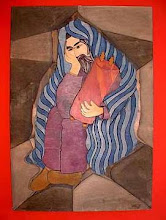via IMRA - Independent Media Review and Analysis
Website: http://www.imra.org.il
Anyone familiar with the simplest basis of deals in the Middle East knows well that the moment one of the parties shows that it is facing pressure, the price tag goes up, and the greater the pressure is, the higher the price tag.
A people that has no patience, and that wants everything now without the ability to suffer the pain of living in the poor, deprived, hungry, thirsty, sick, split, and radical environment that surrounds us, cannot survive in the oh-so-old Middle East, where the Shiites are still fighting for supremacy in Islam, 1,400 years after it was taken away from them, and where terms such as democracy, human rights, minority rights, freedom of women, freedom of religion, and freedom from religion are but a distant dream, much more distant than our impatience.
http://www.imra.org.il
Mideast survival guide
We need patience, ideology, and endurance to survive in Middle East
Mordechai Kedar
YNET Published: 07.19.08, 14:45 / Israel Opinion
www.ynetnews.com/articles/0,7340,L-3570169,00.html
Our enemies read us, hear us, and understand us better than we understand our own self-liquidation process, which we are engaging in with our very own hands.
Our enemies see before them a people that is panic-stricken, emotional, prone to tears, corrupt, hedonistic, reckless, and individualistic; a people subscribing to a grab-what-you can mentality, lacking historical roots, lacking ideology, devoid of values, lacking a sense of solidarity, wanting everything now, and willing to pay any price without taking into account the results of its reckless behavior.
Our enemies see media outlets that took sides, invested endless broadcasting hours and limitless newspaper pages in order to produce a media melodrama out of a wife’s tear and a mother’s sigh, thus creating public opinion with the sense that we should pay any price for an immediate achievement. Yet who appointed the media to determine our national priorities like that? Who determined that it is appropriate to secure the return of two fallen soldiers in exchange for a living murderer? Did anyone in the media think about the future implications of the pressure exerted by the media on our submissive government? Anyone familiar with the simplest basis of deals in the Middle East knows well that the moment one of the parties shows that it is facing pressure, the price tag goes up, and the greater the pressure is, the higher the price tag. Our media and public conduct every time we are facing our enemies – those in Lebanon, Syria, and the Gaza Strip – shows them that they greater the pressure they exert, the higher the price we shall be willing to pay for easing the pressure, whether it is missile pressure or psychological pressure.
Our media and public panic created a situation whereby we, with out very own mouths, are boosting the price of any deal to the point we cannot accept it.
This was our foolish conduct vis-à-vis Hamas in Gaza, vis-à-vis Hizbullah in Lebanon, and vis-à-vis Syria, as every day we hear in the media the “sages of Zion” reciting like a parrot the mantra: “Everyone knows what’s the price of a ceasefire/return of the hostages/peace with Syria,” and when our enemies hear it, why should they demand less than what that fool says “everyone knows”?
Our clock is different
Besides that, our clock is different than that of our enemies: Around here, an average government serves for three years, and therefore it wants to do something in that time and operates out of a sense of pressure that the other side quickly recognizes.
The Muslims, in line with the Koran, believe that Allah is on the side of those who have patience, and patience is found here on two levels: Time and suffering. Allah helps those who do not rush and patiently wait for their dreams to be realized, and in addition, are willing to patiently contend with the suffering inherent in the struggle and expectation for the victory that shall come, God willing. Nasrallah taught all of us some lessons, big time.
A people that has no patience, and that wants everything now without the ability to suffer the pain of living in the poor, deprived, hungry, thirsty, sick, split, and radical environment that surrounds us, cannot survive in the oh-so-old Middle East, where the Shiites are still fighting for supremacy in Islam, 1,400 years after it was taken away from them, and where terms such as democracy, human rights, minority rights, freedom of women, freedom of religion, and freedom from religion are but a distant dream, much more distant than our impatience.
Only a people that is instilled with ideology, possesses a sense of mission and confidence in the righteousness of its path, and feels it is part of a historical process and is willing to suffer and pay the price of survivability in blood, sweat, and tears – only such people can survive in the Middle East. This region is no place for post-Jewish spineless people who are necessarily, sooner or later, also post Zionists.
Dr. Mordechai Kedar is a member of the Arabic-language department and Begin-Sadat Center for Strategic Studies at Bar-Ilan University
Jewish Optimism and the Holiday of the Trees
-
Here is a Dry Bones cartoon about Tu B'Shvat, the holiday of the Trees,
from 1997. It falls on February 2nd this year.
I am going to post the whole blo...
4 hours ago




















No comments:
Post a Comment